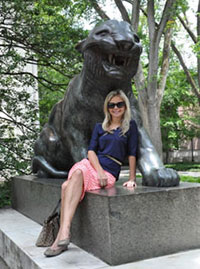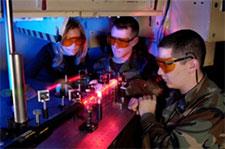AIAA Member Spotlight – May 2018 Written 16 May 2018
AIAA Profiles AIAA Associate Fellow Dr. Martiqua Post
Professor, U.S. Air Force Academy
Advanced Full Range Engine (AFRE) Program Contracting Officer’s Technical Representative, DARPA
By Michele McDonald, AIAA Communications Manager

When Martiqua Post earned her private pilot’s license, the U.S. Air Force Academy (USAFA) professor also learned more about what her students experience.
“I passed my FAA check ride on Memorial Day 2013 at the USAFA airfield,” the AIAA Associate Fellow said. “Sure, a little pride was on the line. Sharing the USAFA airspace with cadets was humbling. We were in this together… we were learning together.
“I now understand what 90% of my students will be doing in their careers and am able to more authentically relate aerospace theory to the application of flight. Furthermore, I much more appreciate the dedication and rigor that it takes to be a pilot.”
An early aptitude in science and math, supported by a godfather handy with multiplication flash cards, helped Post find her current career.

“I have always been inquisitive,” she said. “I always wanted to know how things worked and why. But I also wanted to make things better. My mother, Charlotte, has a tea bag inspirational quote hanging inside the cupboard that says ‘If you can imagine it, you can achieve it.’ I can imagine it! Engineers use models provided by science combined with innovative thinking to solve problems and create new designs that benefit humanity. Engineering seemed a natural fit for me.”
Engineering also meant a career that would be intellectually invigorating and financially stable. “I knew in my career that I would want to continuously learn and experience. Engineering fulfills that desire because so much of engineering is interesting, exciting, and challenging.”
Post earned a Ph.D. in aerospace and mechanical engineering from the University of Notre Dame and a B.S. in mechanical engineering from Union College. Her students and her Ph.D. advisor, Dr. Tom Corke, inspired her to become a teacher.

“While a teaching assistant in graduate school, my students told me that I had a gift for explaining difficult concepts in a way that they were able to understand,” she explained. “This inspired me to consider teaching at the university level and ultimately pursue being a professor.”
And the environment motivates her.
“When I first visited the Air Force Academy and interviewed for a position, I was impressed with the level of integrity among the faculty and students. I was also impressed with how satisfied and fulfilled everyone seemed. I presumed that surrounding myself with satisfied professionals with integrity, I would also be a satisfied professional with integrity. “I believe that I am fortunate to have an admirable profession of teaching and inspiring future leaders of character. I am personally satisfied by inspiring my students, meeting interesting people, and having new experiences from which to grow.”

She’s had some amazing and fun experiences, including flying in a T-38 and F-16, meeting Buzz Aldrin, her sabbatical at Princeton University, and working at and with DARPA.
Post joined AIAA in 2001 while she was earning her graduate degree and wanted to present her work at an AIAA conference. The registration fee was less for student members so she joined, little realizing at the time that she would become a lifetime member. Post has served as chair of the Applied Aerodynamics Technical Committee (2014–2016), as a member of the Student Activities Committee (2011–2014), as a nominator for the Aerodynamics Award in June 2015, and most recently, as an active member of the Executive Steering Committee for the 2019 AIAA SciTech Forum.
“In general, people seem to do well when they enjoy what they are doing and like the people by whom they are surrounded,” she said of her involvement. “I guess I am no different. I enjoy being involved with AIAA because our common goals are stimulating, uniting, and what we are doing is worth sharing. I am continuously learning, and genuinely enjoy meeting other aerospace professionals. It has been my pleasure to be involved with AIAA.”

Post gave a little insight into the 2019 AIAA SciTech Forum, promising it won’t disappoint. “Starting in February 2018, the committee has been meeting by telecom every other week. What I can say: On Demand continues to be a theme, as well as a focus on Autonomous Systems. We also plan to appropriately celebrate the Apollo Anniversary.”
As much as Post has helped AIAA, the Institute has benefited her as well. She credits presenting at an AIAA conference and networking with faculty at USAFA as directly leading to her job on the USAFA faculty. And the contacts continue to grow.
“Early in my career as an AIAA faculty advisor at USAFA, we hosted Dr. John Anderson for a lecture and some time with cadets. A few years later Dr. Anderson in his capacity as curator of the Smithsonian, happily gave me a personal tour of the Air and Space Museum before opening hours. I most certainly met Dr. Dick Miles at an AIAA conference. This started a multi-year discussion that directly resulted in my collaboration and sabbatical at Princeton University. My involvement and networking with AIAA at different levels has enabled me to meet and collaborate with numerous interesting individuals and organizations.”

Post is enthusiastic about her students pursuing careers in aerospace engineering, joining AIAA, and presenting at AIAA forums.
“Go for it!! If you enjoy solving problems and helping people, consider a career in aerospace engineering. There are many opportunities, and I have found it to be a worthwhile and incredibly satisfying profession. Engineering is about always improving and making a difference.”
Post sees transformative technologies that will give her students a fulfilling and busy career. Such technologies include advanced aero-materials and aero-structures needed for hypersonic application as well as batteries or other energy sources needed for energy storage and systems power. In addition, manufacturing techniques are transforming to enable highly complex parts, yet there exist challenges for manufacturing larger parts, Post pointed out.
“We need to be ready to address and accelerate innovation in these and like areas of opportunity,” she noted.
Disruptive aerospace technologies are radical ideas that drastically change the way an established process or organization operates or creates a completely new process or organization. Postal delivery and supply chains could be radically changed by autonomous aerospace systems, Post continued. Also, urban air mobility could help with road congestion. Furthermore, block chaining and digital twins disrupt and potentially transform how aircraft maintenance is tracked and managed.
“We need the foresight to invest in these technologies now and plan for transformations and disruptions,” she said. “Aerospace technologies of today and the future will have to disrupt or be disrupted.”
Post is ensuring engineering students are prepared for these challenges. She coauthored an AIAA Education Series book with Dr. Steven Brandt and Dr. D. Neal Barlow, titled Introduction to Engineering: A Project-Based Experience in Engineering Methods. Post said she hopes beginning engineers will learn from the approach to engineering problems presented in the book, which uses the challenge of designing a hypersonic vehicle.

The challenge includes a statement of work specifying the requirements such as vehicle capabilities and physical characteristics of a test vehicle they must design, build, and demonstrate. The book breaks the problem into “several solvable sub-problems and provides knowledge such as Newton’s laws, the principles of rocket propulsion and aerodynamics along the way.”
Post noted that “students are encouraged to build and fly test vehicles which are subscale, model-rocket-sized vehicles that demonstrate the same basic physics required by the full-scale vehicles. Our hope is that students will discover the fascinating, challenging, and motivating world of engineering.”
When not teaching the next generation of aerospace engineers, Post enjoys traveling and has visited all 50 states and 42 countries. Her journeys have dovetailed with a love of photography.
Post has served as the “officer representative” for the USAFA women’s gymnastics team. Now, her interests keep her closer to home.
“My current involvement in gymnastics takes the form of supporting my 4-year-old daughter, Ariella, at gymnastics practice. She does an exceptional backbend and handstand against the wall! And I can still do that, too!”
